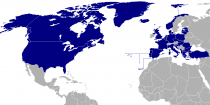The United Nations on Nov. 17 announced that it will provide $100 million in emergency aid for food and related relief to six countries. It will come out of the UN Central Emergency Response Fund. The largest amount, $30 million, will go to Yemen. The remaining funds will cover food aid to parts of Nigeria, Burkina Faso, the Democratic Republic of Congo, South Sudan, and Afghanistan.
World Food Program Director David Beasley and UN Office for the Coordination of Humanitarian Affairs Director Mark Lowcock, who made the announcement, also wrote a joint opinion column Nov. 17 that was published by The Times of London, titled, “We’ve Averted Famine in the Past — We Must Do It Again.” They began, “Humankind’s greatest success was to consign famine to history,” but now it is back, and this is “heart wrenching and obscene.” They said, “The world has been understandably preoccupied with COVID-19, but this must not distract us from the bigger killer.” They called for action. “Do nothing and it will be the catalyst for the grand reversal — the avoidable unravelling of decades of progress.”
Their op-ed states: “The UN’s COVID-19 Global Humanitarian Response Plan requires $10 billion. A drop in the ocean compared to the $12 trillion stimulus packages of wealthy nations or the $8 trillion collective net worth of the world’s 2,000 billionaires.”
On Yemen in particular, they point out, “Countries in the region and beyond should collaborate to finance the Yemen relief effort, stabilize the shattered economy, support longer-term development and bring pressure to bear on the warring parties to silence the guns and make peace.” Beasley and Lowcock conclude, “Famines are a stain on humanity. Now is the time to act.”











